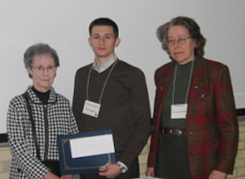

 Danny Quaglietta
Danny QuagliettaDanny Quaglietta is an MSc candidate in the Department of Physiology at the University of Toronto. Under the supervision of Dr. Carin Wittnich, Danny's thesis work is looking at whether gender plays a role in the metabolic response of the newborn heart to global ischemia.
New evidence now suggests that female sex is a risk factor for in-hospital mortality in children undergoing surgical repair for congenital heart disease. Despite females being younger at time of surgery, and undergoing less complex procedures, the overall odds of mortality is 51% greater in female compared to male children. There is evidence in adult literature to suggest that gender affects the heart's metabolic response to ischemia resulting in worse post-ischemic outcome, however whether these differences occur in the newborn heart that could explain worse outcome in females is currently unknown and was studied.
Danny's work has shown that the newborn female heart is at a metabolic disadvantage during ischemia, demonstrating both lower energy levels and greater tissue lactic acidosis. These results suggest that newborn females are more susceptible to metabolic damage during ischemia which may offer a potential explanation for increased morbidity and mortality in female children following heart surgery.
Danny's work highlights that female gender is also an important factor that regulates cardiac metabolism in the newborn heart and currently he is investigating possible mechanisms that may be mediating these differences.

Left to Right: Mrs. G. Phenix, Danny Quaglietta, Dr. C. Wittnich, Director, CSCP